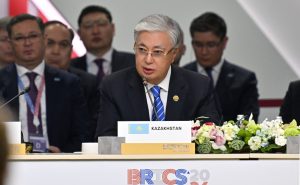The 16th BRICS summit, hosted last month by Russia in Kazan, was attended by 36 delegations and 20 heads of state. Under Russia’s chairmanship of the BRICS, more than a dozen countries expressed interest in joining the organization, such as Syria, Thailand, Malaysia, Azerbaijan, and Turkiye. However, it is interesting to note that Russia’s neighboring ally, Kazakhstan, which is a part of every other Russia-dominated regional organization, has not applied for membership and has asserted that it will not do so for the foreseeable future.
Rather, Astana has emphasized its commitment to strengthening its role as a close partner of BRICS. Kazakhstan’s reluctance reflects a shifting trend in the region, where Russia’s influence in Central Asian politics is receding, allowing nations a greater degree of autonomy in charting their foreign and economic policies.
The Shift in Astana’s Foreign Policy Priorities
The expansion of BRICS in January, with the inclusion of Iran, Saudi Arabia, the UAE, Egypt, and Ethiopia, has broadened the organization’s scope. Some of these countries, along with India and Brazil, maintain strong political relations with the West and perceive BRICS as a “non-Western” rather than an “anti-Western” bloc – one aimed at providing greater agency to the global South and emerging economies. In this context, Kazakhstan’s potential membership in the BRICS holds strategic importance for Russia, as BRICS is a manifestation of Russia’s perception of an ideal world order. Thus, with a GDP of $262 billion, annual growth of 5 percent, and substantial infrastructure development initiatives, Kazakhstan’s inclusion would have bolstered BRICS as a unified non-Western bloc.
Reasons for Rejection
One of the official reasons cited for Kazakhstan’s refusal include the long, drawn-out membership procedure, further compounded by BRICS’ moratorium on new applications, and the bloc’s developmental prospects.
Kazakh President Kassym-Jomart Tokayev’s address at the BRICS summit emphasized Astana’s readiness to collaborate with BRICS through a platform of partnership and cooperation, aiming to address both regional and global challenges while refraining from pursuing full membership in the association.
Astana’s disinterest in formally joining the BRICS is mainly rooted in the balancing of economic interests and geopolitical considerations, as Kazakhstan’s national interest does not align with the primary goal of the BRICS, which is to promote a non-Western alternative driven by the virtues of multipolarity and inclusive globalization, aimed at granting more agency to the emerging economies in the Global South. Rather, the present Western order serves Astana’s national interests better. Over the years, the influence of the European Union has considerably increased Kazakhstan’s political economy and influenced Astana’s foreign policy calculus and business operations. The country’s economy remains dependent on the export of oil and metals, with the EU is an important trade partner. Growing relations with the West underscore a broader vulnerability, making any further outreach toward Russia potentially risky given the increasing tranches of Western sanctions against Moscow for its invasion of Ukraine.
The Irrelevance of Regional Organizations
The war in Ukraine has highlighted the ineffectiveness of regional organizations for Kazakhstan, revealing that their efforts have often been largely symbolic rather than yielding tangible results.
For instance, the Shanghai Cooperation Organization (SCO), of which Astana has been a member for the past 26 years, has not produced any significant dividends for Kazakhstan. Furthermore, with the ongoing conflict in Ukraine and the sanctions imposed against Russia, new challenges are emerging in trade and payments with the SCO’s largest member, Russia.
For this reason, membership in the BRICS is viewed with a degree of skepticism. Tokayev’s emphasis on the presence of a “fair world order” while adhering to international law indicates Kazakhstan’s concerns regarding current international events. Kazakhstan’s displeasure against Russian revanchism, carving out its sphere of influence in the post-Soviet space, and Moscow’s invasion of Ukraine can be reflected in the language employed by Kazakhstan, where – without any direct criticism towards Russia – variables such as faith in international law and wanting to play a proactive role in the United Nations in bringing just and equitable solutions are employed. In other words, Kazakhstan is slowly beginning to distance itself from regional and multilateral blocs that have yielded it minimal benefits.
The Limits of Kazakhstan’s Multivector Foreign Policy
Despite Kazakhstan’s participation in forums where Russia has considerable influence, such as the Collective Security Treaty Organization, the Commonwealth of Independent States, the SCO, and the Eurasian Economic Union, its hesitancy to join BRICS reflects a new trend.
Kazakhstan’s engagement with the European Union has been expanding, with trade turnover reaching $43 billion in 2023, alongside increased EU investments and a growing presence of economic powers like China in the Kazakh economy, which has resulted in a progressive decline of Russia’s influence in Kazakhstan.
Meanwhile, Kazakhstan’s importance in Moscow’s calculus has increased, with Astana becoming a critical interim destination for sanctioned goods since 2022, thereby gaining leverage over Moscow. Additionally, Russian soft power has been declining within Kazakh society, which is increasingly orienting toward the Euro-Atlantic. Kazakhstan’s disinterest in deepening ties with Moscow is compounded by concerns over the risks of a revisionist Russia, as well as a lack of confidence in non-Western organizations that fail to provide substantial economic benefits. These factors have driven Astana to pursue a more Westward course.
In Astana’s foreign policy calculus, joining BRICS would entail obligations to participate as an active member and plausibly contribute to the formation of an alternative world order through this non-Western bloc. Put another way: Kazakhstan is sitting on the fence and watching how the BRICS further takes shape before making any bets on it. Astana is taking a middle road by diversifying its foreign policy engagements, with a stronger focus on the West, while veering away from its Soviet legacy.

































